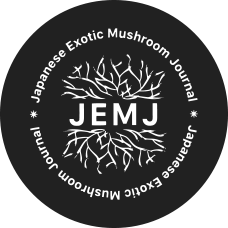Login or Subscribe
You must be logged in to access this content
Subscribe for free access to Japanese Exotic Mushroom Journal and gain insider knowledge on effective cultivation methods for Japanese mushroom species. Elevate your skills with expert tips and innovative technologies to master the art of growing Japanese exotic mushrooms.
◆ Discover exclusive Japanese mushroom cultivation techniques
◆ Learn innovative methods to enhance mushroom quality and yield
◆ Tap into Japan's rich heritage for unique growing insights
◆ Discover exclusive Japanese mushroom cultivation techniques
◆ Learn innovative methods to enhance mushroom quality and yield
◆ Tap into Japan's rich heritage for unique growing insights
Subscribe Now for Free Login
Prepping Your Body for the Coming Season with Mushrooms: Getting Ready for the Summer Heat
First published in Issue 53 of MP Kinoko Quarterly, the flagship publication of the Japan Kinoko Meister Association.
Professor Hiroaki Yoshimoto, Faculty of Health and Nutrition, Minami-Kyushu University
Professor Yoshimoto studies the relationship between mushroom substrates and pharmacological effects, “sixth industry” initiatives, development of new mushroom products, marketing, and design.Translator`s notes:Mushrooms offer multiple health benefits, supporting sleep quality, muscle recovery, and overall vitality. Incorporating mushrooms into daily meals can help prepare the body for seasonal changes, prevent fatigue, and enhance physical performance. Professor Hiroaki Yoshimoto of Minami-Kyushu University summarizes research into different nutraceutical compounds in mushrooms and how these can help protect against heat-related illnesses during hot summers. As demonstrated by multiple scientific studies, the bioactive compounds present in mushrooms play a significant role in improving sleep, boosting exercise performance, and offering neuroprotective effects.As Chief Editor of the Japanese Exotic Mushroom Journal, I have written about the topic of mushrooms as a super-food at length, though my biggest interest was and is in beta-glucans. Professor Yoshimoto does an excellent job of summarizing different studied health benefits of mushroom-based compounds and highlighting how they can each help address common seasonal health issues and promote better over all general health as part of a balanced diet. Article one of this four-part series begins with summer.Start adding mushrooms to your diet today for a healthier tomorrow!.jpg)
Introduction
Mushrooms play a significant role in our diet, contributing not only to culinary diversity but also possessing extensive health benefits. Japan is considered a “kingdom of mushrooms,” where both wild and cultivated varieties are widely available to consumers. This article explores how mushrooms can improve sleep quality, help exercise recovery, and combat seasonal fatigue while enhancing overall well-being.Preventing Summer Fatigue: How Your Spring Diet Has an Impact
In recent years, as a result of both global warming and an aging society, the number of heat-related deaths has increased (Figure 1). In addition, in 2018, there were 92,710 cases of heat-related hospitalizations, followed by 66,869 in 2019, and 64,869 in 2020. Despite these fluctuations, heatstroke remains a significant health concern, particularly among the elderly.Additionally, the number of people experiencing summer fatigue or heat-related ailments has also risen. A survey found that 74.3% of Japanese residents now reported having experienced “summer fatigue” at least once, while 24.3% reported experiencing it every year. Issues like summer fatigue and heatstroke related to the summer heat or intense sunlight directly impact people’s desire to move and their overall quality of life. Thus they require active coping measures to prevent.
Standard preventative measures include 1) proper hydration throughout the day, 2) not setting indoor temperatures too low, 3) maintaining a balanced diet, 4) getting adequate sleep, and 5) having an exercise routine. Among these measures, 3~5 can be improved by the consumption of mushrooms. For this article, I would like to explain how mushrooms can improve quality of sleep and exercise.
Mushrooms and Sleep
Mushrooms contain several bioactive compounds that support sleep quality, such as theanine, glycine, tryptophan, serine, crocetin, ornithine, GABA (Gamma-Aminobutyric Acid), and ergothioneine. While mushrooms have differing concentrations of these compounds as well as differences between species, these are a list of compounds confirmed to be present in mushrooms.A clinical trial used 200-400mg of theanine, 3g of glycine, 300mg of tryptophan, 3g of serine, 7.5mg of crocetin, 2.6g of ornithine, 2,160mg of GABA, and 5mg of ergothioneine per day. Among these compounds the one most often discussed in conjunction with mushrooms is ergothioneine. Ergothioneine is an antioxidant; a compound which protects the body’s cells from damage. Ergothioneine is found in mushrooms, beans, whole grains, with golden oyster, oyster, eryngii, enoki and shiitake mushrooms all abundant in ergothioneine. Golden oyster mushrooms in particular contain high concentrations of ergothioneine; as much as 1000~1500mg of ergothioneine per 100g serving.A clinical trial undertaken in Japan on 48 otherwise healthy subjects with mild dementia researching the effect of golden oyster mushroom-derived ergothioneine had subjects consume 2.5mg supplementation of ergothioneine twice a day delivered orally over the course of 12 weeks. The trial found that those receiving ergothioneine scored higher on an online exercise designed to test mental ability than those in the control group, with the test group displaying faster response times, improved linguistic function, attentiveness, and extended attention capability that were all statistically significant.While we cannot directly correlate these results to sleep on the basis of this study’s design alone, looking at it more broadly, and taking into account the larger field of research, we can consider that ergothioneine may be contributing to improved sleep quality.Mushrooms and Exercise
As our understanding of the root causes of metabolic syndrome has advanced, many people are now encouraged to exercise during the yearly health exams. The Ministry of Economy, Trade, and Industry’s Survey of Selected Service Industries found that fitness clubs and sports gyms, while experiencing some downturn as a result of the COVID-19 pandemic, are between a 24.5~33.7 trillion-yen industry, (163~224 billion dollars, roughly, 2018~2022 data). The industry reported between 145,000,000 and 220,000,000 users (2018~2022).While the total number of people with gym memberships remains lower than the United States and United Kingdom, this number is expected to increase in the coming years (Figure 2). Exercise is taken up either as part of a diet, or to build strength, or as either treatment for a disease or preventative measure for disease. It is well known that mushrooms are generally high in protein, especially in proportion to their low caloric content, but I would like to introduce the compounds in mushrooms that maybe useful in strength training and conditioning.In order to build strength, the branched-chain amino acids (BCAAs) that both power and make up muscle are indispensable. The three BCAAs used by humans are valine, leucine, and isoleucine; these three amino acids make up roughly 35% of the amino acids found within muscle. The role of BCAAs in building up strength is primarily as follows: 1) Use as a source of energy by muscle cells. During exercise, BCAAs are used as an energy source. 2) Preventing the degradation of muscle. Increasing the concentration of BCAAs in the blood during exercise can slow down or prevent muscle damage and improve training quality. 3) As a component of muscle mass. Leucine in particular is believed to have a strong impact on muscular development.Mushrooms contain all essential amino acids (EAAs), with a particularly high concentration of BCAAs. Normally, high concentrations of BCAAs are found in animal based-protein, but mushrooms can be an important source of BCAAs as plant-based protein, especially for those who do not eat meat. Looking up which mushrooms contain the highest quantities of BCAAs in the Ministry of Education, Sports, Culture, Science and Technology’s food ingredients and nutrition database showed the BCAA content per 100 gram serving of white oyster mushrooms (750mg), black abalone mushrooms (460mg), golden oyster mushrooms (440mg), oyster mushrooms (420mg), shiitake (400mg, artificially cultivated), brown button mushrooms (380mg), shiitake (379mg, log cultivated), white button mushrooms (368mg), eryngii (367mg), enoki (310mg), and bunashimeji (310mg).In order to build up strength, the daily recommendations for BCAA intake are between 10~20g. Therefore, while mushrooms alone are not a practical source of attaining this intake, when you consider the other health benefits of mushrooms, you could not go wrong by adding more mushrooms to your diet.Adding mushrooms to your diet on a regular basis can improve sleep (which itself improves muscle recovery), and help provide essential BCAAs for building and maintaining muscle. By improving these two aspects of your health, you can build a stronger body and greater stamina to withstand the hot summer months. In order to not lose to summer heat, please start taking steps now to build a better foundation to protect your quality of life during prolonged heat waves.





 1-2-13 Honmachi, Komoro city, Nagano prefecture, Japan 384-0026
1-2-13 Honmachi, Komoro city, Nagano prefecture, Japan 384-0026